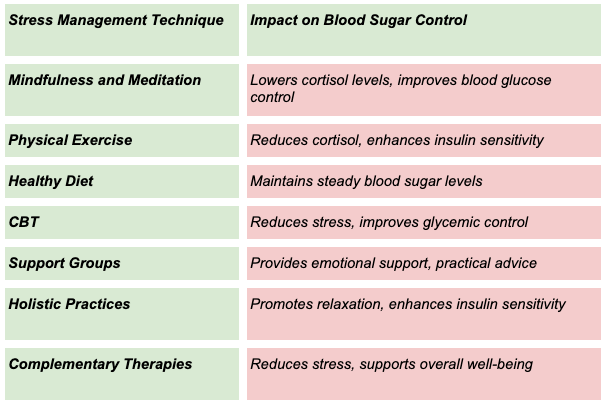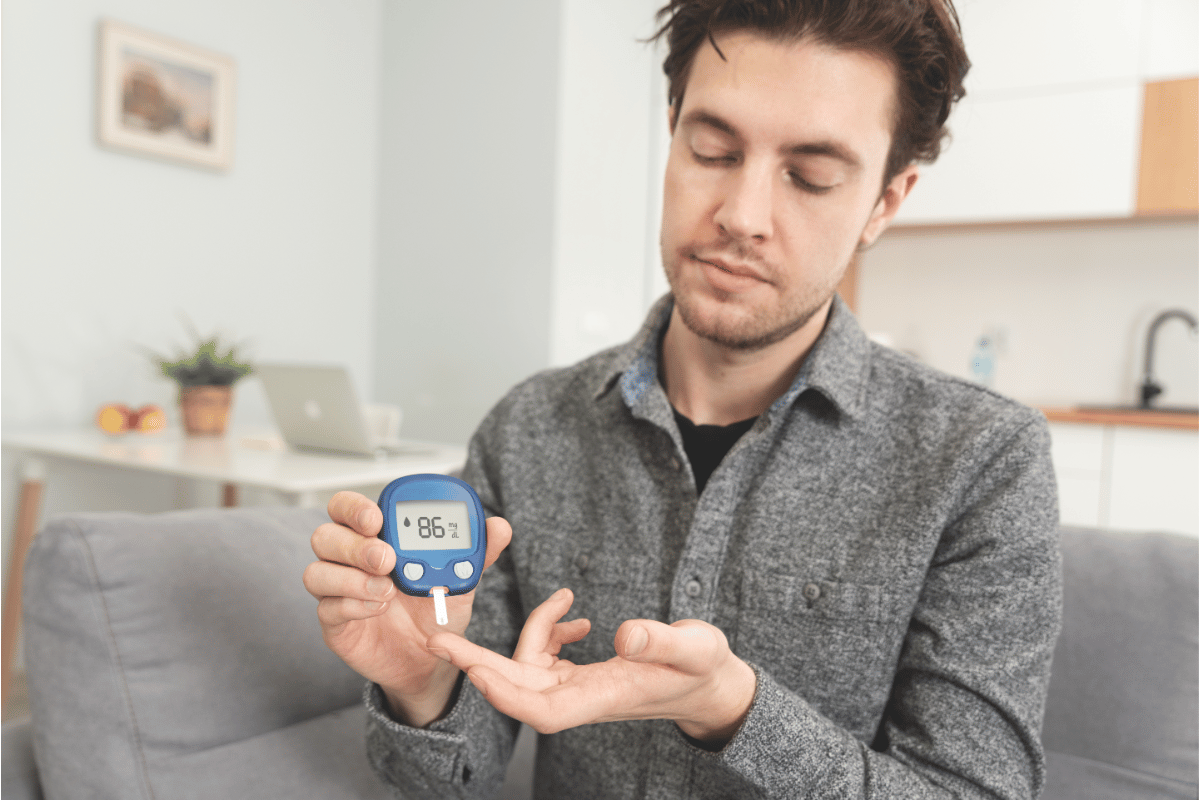Understanding the Connection Between Stress and Blood Sugar Control
Managing stress is crucial for overall health, but did you know it also significantly impacts blood sugar control? Whether you have diabetes or are trying to prevent it, understanding how stress affects your blood glucose levels is essential.
In this article, we’ll examine the connection between stress and blood sugar, covering the mechanisms, behavioral responses, and effective management techniques to help you maintain optimal health.

Impact of Stress on Hormonal Balance
When you’re stressed, your body undergoes a series of physiological changes, primarily driven by the release of cortisol and adrenaline. These stress hormones are part of your body’s natural “fight or flight” response, which prepares you to handle a perceived threat.
Adrenaline and cortisol can significantly increase your blood sugar levels. Adrenaline raises glucose levels by promoting the breakdown of glycogen, a stored form of glucose in your liver. Cortisol increases glucose production and reduces its uptake by cells, leading to higher blood sugar levels.
Prolonged stress can cause chronic hormonal imbalances, disrupting your body’s ability to effectively regulate blood glucose. Persistent high cortisol levels can lead to insulin resistance, a condition where your cells don’t respond well to insulin, making it harder for glucose to enter the cells and be used for energy.
Mechanisms Linking Stress and Blood Sugar Control
Under stress, your body activates gluconeogenesis, a process where the liver produces glucose from non-carbohydrate sources. This mechanism is essential for providing energy in emergencies but can lead to elevated blood sugar levels when stress is chronic.
Chronic stress not only elevates cortisol levels, disrupting insulin’s ability to manage blood glucose, but also promotes inflammation that can diminish insulin sensitivity. To counteract these effects, ensuring a balanced intake of essential vitamins and minerals is crucial. pure health blood sugar formula can be an effective way to incorporate these key nutrients into your diet, supporting overall glucose metabolism and maintaining healthy blood sugar levels. It’s a proactive step towards managing stress and its impact on your body.
Behavioral Responses to Stress and Their Effects on Blood Sugar
Stress often leads to emotional eating, where you might crave high-carb and high-sugar foods. These comfort foods can cause spikes in blood sugar levels, making it difficult to maintain healthy glucose levels.
Stress-related fatigue not only diminishes your motivation for physical activity but also impacts crucial aspects of health like insulin sensitivity and glucose control. When stress reduces your activity levels, your body’s ability to regulate blood sugar deteriorates.
Additionally, stress can severely disrupt your sleep patterns, resulting in poor sleep quality and shorter durations. This lack of sleep can negatively influence glucose metabolism, heightening the risk of insulin resistance and elevated blood sugar levels.
To help manage these effects, consider incorporating pure health blood sugar formula into your diet to support healthy blood sugar levels and combat the adverse effects of stress. Integrating this formula could be a proactive step towards maintaining better overall health and wellness.
Stress Management Techniques for Blood Sugar Control
Practicing mindfulness and meditation can significantly reduce stress levels. Studies have shown that these techniques can lower cortisol levels and improve blood glucose control. Regular practice can help you manage stress more effectively, promoting overall well-being.
Engaging in regular physical exercise is a powerful way to manage stress and improve insulin sensitivity. Activities like walking, jogging, and yoga can help reduce cortisol levels and enhance your body’s ability to regulate blood glucose.
Maintaining a healthy diet is crucial for mitigating the impacts of stress on blood sugar levels. Focus on consuming low glycemic index foods, which release glucose more slowly into the bloodstream, helping to maintain steady blood sugar levels.
Psychological Interventions and Support Systems
Cognitive Behavioral Therapy (CBT) is highly effective in reducing stress and improving glycemic control. By changing negative thought patterns and behaviors, CBT can help you better manage stress and maintain healthy blood sugar levels.
Joining support groups or seeking counseling can provide emotional support and practical advice for managing stress and diabetes. These resources can help you feel less isolated and more empowered to take control of your health.
Integrative Approaches to Managing Stress and Blood Sugar
Incorporating holistic health practices like yoga and tai chi can benefit stress relief and blood sugar management. These practices promote relaxation and enhance insulin sensitivity, supporting overall health.
Complementary therapies such as acupuncture and aromatherapy can also play a role in managing stress and blood glucose levels. While more research is needed, many individuals find these therapies helpful in reducing stress and improving overall well-being.
Monitoring and Adjusting Blood Sugar in Stressful Situations
Using Continuous Glucose Monitoring (CGM) technology allows you to track blood sugar fluctuations in real-time. This can be particularly useful during periods of acute stress, helping you make timely adjustments to your diabetes management plan.
During stressful times, it may be necessary to adjust your insulin doses. Consult with your healthcare provider to determine the best approach for managing your insulin during periods of increased stress.
Future Research Directions
Ongoing research is continually uncovering new insights into the link between stress and diabetes. Staying informed about these studies can help you adopt the latest strategies for managing stress and blood sugar levels.
Exploring new approaches and technologies in stress and blood sugar management can provide additional tools for maintaining optimal health. Innovations in wearable technology, biofeedback, and stress management apps are just a few areas of exciting development.

Understanding the connection between stress and blood sugar control is vital for managing your health effectively. By recognizing the impact of stress on hormonal balance, behavioral responses, and glucose metabolism, you can adopt targeted strategies to maintain optimal blood glucose levels.
Whether through mindfulness, exercise, or dietary changes, managing stress is a key component of diabetes care.
FAQs
Can stress cause high blood sugar levels?
Yes, stress can increase blood sugar levels by triggering the release of cortisol and adrenaline.
How can I manage stress to control my blood sugar?
Practicing mindfulness, engaging in regular physical exercise, and maintaining a healthy diet can help manage stress and control blood sugar.
Is it necessary to adjust insulin during stressful periods?
Yes, during periods of increased stress, it may be necessary to adjust insulin doses. Consult with your healthcare provider for guidance.
By following these strategies and seeking professional advice, you can better manage stress and maintain healthy blood sugar levels. For more information and support, consider joining a diabetes management program or support group.







